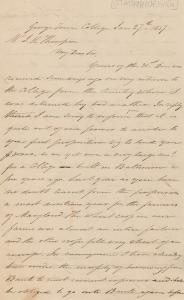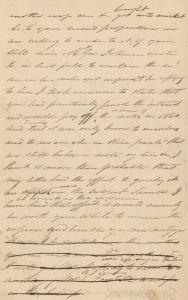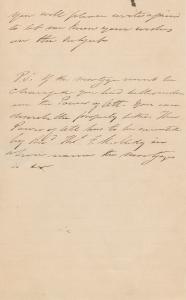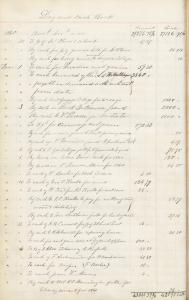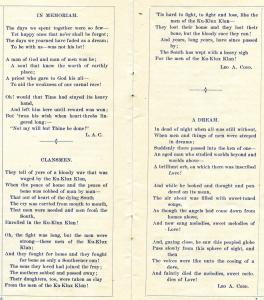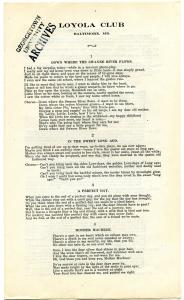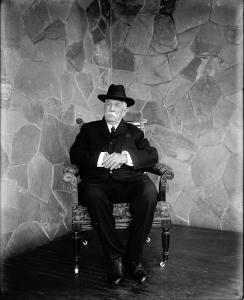On January 17, 2024, Loyola University Maryland issued the report of a President’s Task Force Examining Connections to Slavery. It acknowledged that the 1838 mass sale by the Jesuits financed its founding in 1852 and that its faculty and staff strongly identified with the Confederacy well into the twentieth century. This exhibition features documents uncovered by a research team of Loyola faculty and students who visited the Booth Family Center for Special Collections.
Formed in 2021, the President’s Task Force included GU272 descendants in addition to Loyola faculty, staff, and students. The report recommended that Loyola University Maryland address the legacy of slavery and racism in the curriculum, engage with the GU272 community and honor their ancestors, and make Loyola accessible to GU272 descendants and the broader community.
Procurator Discloses that the 1838 Sale Financed Loyola College, January 27, 1859
Charles Lancaster, S.J., Procurator of the Maryland Province, declined to issue a new mortgage of $30,000 to John R. Thompson because the Province needed to defray the large debts incurred to establish Loyola College. Thompson was re-negotiating the debt incurred by Henry Johnson in 1838 to finance the acquisition of 140 enslaved people from the Province. In 1851, Thompson assumed these debts when he purchased Chatham Plantation in Ascension Parish, Louisiana.
Archives of the Maryland Province of the Society of Jesus
Loyola Hires Out an Enslaved Man
On December 14, 1860, the Jesuits posted their annual payment of $32 to Mrs. H. S. Manning for the labor of an enslaved person whom she hired out to Loyola College. The first recorded payment to Mrs. Manning was more than 5 years earlier, in July 1855.
Procurator’s Day and Cash Book, Archives of the Maryland Province of the Society of Jesus
“Clansmen,” by Leo A. Codd
Published by the Literary Societies of Loyola College, “Clansmen'' by Leo A. Codd (Loyola College, 1916) is an example of “Lost Cause” literature which portrayed Reconstruction as illegitimate. The poem extolls the heroism of the Ku Klux Klan, a vigilante group formed in 1865 that terrorized politically active freedmen until federal action suppressed them in 1872.
The Loyola (November 1913), Archives of the Maryland Province of the Society of Jesus
Loyola Club Distributes Songs Romanticizing Dixie
The Loyola Club published song lyrics for student sing-alongs that romanticized the family, communities, and landscape of the Old South. This songbook included “Down Where the Swanee River Flows,” written by Stephen Foster in 1851 for blackface minstrel shows.
Archives of the Maryland Province of the Society of Jesus
George Carrell Jenkins at Loyola’s Evergreen campus, 1928
A financier and philanthropist, George Carrell Jenkins (1836-1930) was a Confederate veteran and proponent of the Lost Cause who funded Loyola's expansion on the Evergreen campus. The Loyola task force has recommended re-naming Jenkins Hall, which was built in 1922 as the science building and currently houses a quiet study space and computer laboratory.
Photograph by John Brosnan, S.J., Brosnan Photographic Collection, Woodstock Theological Library
The members of the Loyola President's Task Force Examining Slavery were: Diana Betz, Ph.D., Associate Professor of Psychology ; David Carey Jr., Ph.D., Doehler Chair in History; Alexis Faison, Loyola Class of 2024; Stephen Fowl, Ph.D., Former Dean, Loyola College of Arts and Sciences (co-chair); Afra Hersi, Ph.D., Dean of the School of Education; John Kiess, Ph.D., Associate Professor of Theology (co-chair); Jenny Kinniff, Head of Archives and Special Collections, Loyola/Notre Dame Library; Grace Murry, Loyola Class of 2023; Lynn Nehemiah, DDS, GU272 Descendant Community; Rodney L. Parker, Ph.D., Chief Equity and Inclusion Officer; Mélisande Short-Colomb, GU272 Descendant Community; Karsonya “Kaye” Wise Whitehead, Ph.D., Professor of Communication and African and African American Studies; Executive Director of the Karson Institute for Race, Peace & Social Justice.

